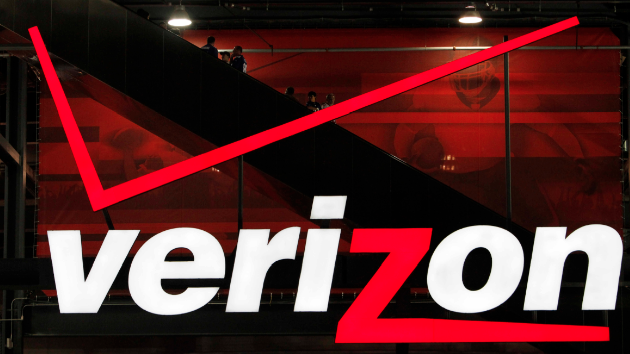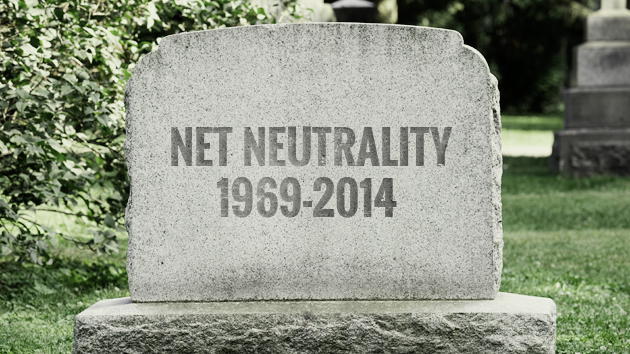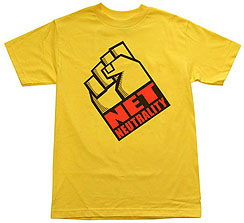
Peter Morgan/AP
Verizon lobbyists are canvassing Capitol Hill with a curious new argument against net neutrality—it hurts disabled people.
The odd pitch comes as the Obama administration is mulling a plan to scrap net neutrality—the idea that Internet service providers should treat all websites equally—and instead allow ISPs to create Internet “fast lanes” for companies that can afford to pay for speedier service. The proposal, which is under consideration by the Federal Communications Commission, has sparked a massive public outcry, including an “Occupy the FCC” protest and a letter signed by 150 tech companies, including Google, Amazon, and Netflix, opposing the plan.
Three Hill sources tell Mother Jones that Verizon lobbyists have cited the needs of blind, deaf, and disabled people to try to convince congressional staffers and their bosses to get on board with the fast lane idea. But groups representing disabled Americans, including the National Association of the Deaf, the National Federation of the Blind, and the American Association of People with Disabilities are not advocating for this plan. Mark Perriello, the president and CEO of the AAPD, says that this is the “first time” he has heard “these specific talking points.”
There’s no doubt that blind and deaf people, who use special online services to communicate, need access to zippy Internet. Similarly, smartphone-based medical devices that are popular with disabled people require fast Internet service. Telecom industry lobbyists have argued that, without a fast lane, disabled Americans could get stuck with subpar service as Internet traffic increases. AAPD’s Perriello says this rationale could be genuine but seems “convenient.”
Defenders of net neutrality are more cynical. The Verizon lobbyists’ argument is “disingenuous,” says Matt Wood, a policy director at Free Press, an Internet freedom advocacy group. The FCC says that even if the agency doesn’t go through with its fast lane proposal, companies that serve disabled people would still be able to pay internet service providers for faster service.
A spokesman for Verizon wouldn’t confirm that Verizon lobbyists have used the disabled access pitch, but he says the company’s position on the FCC’s proposal is “not disingenuous.” (Verizon has not taken a public stance on the FCC’s proposed fast lane rule.) An FCC spokesman says the agency is evaluating the industry’s disability argument.
The roots of the net neutrality fight go back more than a decade. In 2002, the George W. Bush-era FCC decided to classify the internet as an “information service” instead of a public utility, protecting internet services from the stringent regulations that land line phones fall under. For years, free Internet advocates urged the FCC to reclassify the internet, but the commission resisted.
Last month, the FCC dealt a major blow to net neutrality by proposing new rules that would allow Internet service providers to charge online content providers such as Facebook and Netflix higher rates for faster service. The move caused a national outcry. Last week, the FCC’s website crashed after comedian John Oliver urged Internet “trolls” to comment at the agency’s website. In response to public ire, the FCC has said it will reconsider classifying the Internet as a common utility.
The telecom industry is striving to ensure that the agency doesn’t do that. In 2014 alone, Internet service providers have spent close to $19 million lobbying on net neutrality, according to Senate lobbying records:

Overall, ISP lobbying has exploded over the past decade:

This is not the first time the industry has cited the needs of disabled people as it sought to influence FCC rules. Verizon made this argument five years ago when the commission was drafting new regulations for ISPs. In a 2009 speech, former Verizon Communications CEO Ivan Seidenberg said that if his company was not allowed to prioritize certain medical data over internet traffic like email and spam, then people with health conditions might not benefit from life-saving technological advances.
The decision the FCC makes in the coming months could “change the course of the Internet for a long time to come,” says Michael Copps, who served as an FCC commissioner from 2001 to 2011, “perhaps in ways that will be impossible to reverse.”











